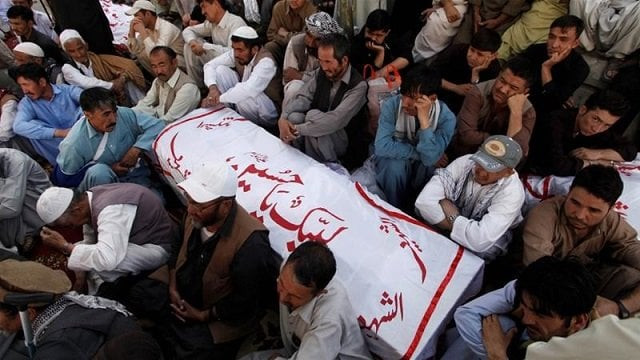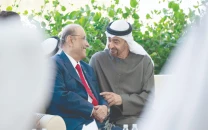CJP calls killing of Hazaras 'ethnic cleansing'
Asks police agencies to submit the measures that can be taken to protect the community

PHOTO: REUTERS
“For me the targetted killing of the Hazara community in Quetta is ethnic cleansing and that is why I had to take suo motu notice. We have no words to condemn the killings of Hazaras,” said the CJP on Friday while leading a two-judge bench also comprising Justice Ijazul Ahsan at the Supreme Court’s Quetta Registry.
On May 2, Justice Nisar took suo motu notice of recent attacks on the beleaguered community and summoned a report from the Balochistan government, Levies, police, and the Interior Ministry.
Earlier, leaders of the community appeared before the bench and told it about their plight.
“The Hazaras are being killed for the last 20 years but no one has been arrested till this date,” Advocate Iftikhar Ali, a leader of the community, told the court.
He said the Hazaras faced systemic discrimination and were denied admissions to universities. “We are facing personal and financial losses due to this persecution,” he said
Ali said due to these circumstances a large number of community members had also tried to migrate to Australia. “Meanwhile, security of 15 of our leaders has been withdrawn," he said.
However, the DIG Quetta denied the claim about withdrawing security.
Justice Nisar asked Balochistan Inspector General Police (IGP) Moazzam Jah Ansari and agencies to submit the measures that can be taken to protect the community.
CJP takes suo motu of Hazara killings
The CJP asked the Balochistan IGP if a report had been prepared on the targetted killings. Ansari then presented the bench with the report, which said 399 Hazaras were killed in various incidents of terrorism in the last six years.
The highest number of Hazaras (208) was killed in 2013, while 19 people from the minority community and 20 settlers were killed in 2012, it said.
“Nine members of the Hazara community have been targeted in Balochistan in the last four months,” the IGP said, adding that 106 security personnel have also been killed since 2012 in targetted attacks.
"Twenty-eight personnel have been martyred so far in various incidents across the province this year. The security situation in the province has improved now," he added.
Another leader of Hazaras, Major (retd) Nadir Ali, lamented that a joint investigation team (JIT) formed to investigate targetted killings of the Hazaras could not produce any significant results. Justice Nisar ordered the IGP to directly look into the issue.
Qayyum Changezi, another representative of the Hazara community who appeared in the court on Friday, claimed that the terrorists who had been convicted in terrorism cases were still not punished. He also lamented that the families of the martyrs had not been given jobs.
Interior minister assures Hazara community of security
Missing person
The chief justice also took notice of a separate petition filed by a Hazara woman whose husband has reportedly gone missing and advised IGP Ansari and the Frontier Corps to contact intelligence agencies for assistance in the matter.
“We cannot exist peacefully without state institutions. We should not consider them as our enemies,” the top judge said in a reference to the intelligence agencies.
“I met the Hazara community recently. They were so afraid, they wouldn’t even lodge complaints or request the Supreme Court, while killers of the community are holding public rallies,” Justice Nisar said.
The CJP ordered the authorities to improve and implement a security plan immediately. He later adjourned the hearing till after Eid-ul-Fitr.
Kharan killings
Heading a two-judge bench, the CJP also heard a suo moto case against the last week’s targetted killing of six Punjabi labourers in Balochistan’s Kharan district.
The labourers, working for a private company, were killed by terrorists on May 4. Another worker was injured in the firing incident. All the labourers were from Okara district.
The home secretary submitted a report on the incident. The chief justice noted that neither the government nor the contractor provided any security to the workers.
The home secretary said the private company’s contractor had neither applied for an NOC nor asked the government for security for the workers. “We have registered an FIR and started an investigation into the incident,” he told the court.
Observing that security was the responsibility of the private company and contractor, the CJP asked who had come to represent the company and contractor. The company lawyer told the bench the company would give financial assistance to workers’ children and widows.
Terrorist involved in Hazara community killings shot dead in Mastung
Doctors’ protest
Hearing a suo moto case regarding the protest by the Young Doctors Association (YDA), the SC chastised the protesting doctors and advised them to first come to their workplace, do their jobs, and then make demands.
The bench also summoned Balochistan Chief Secretary Aurangzeb Haq and Young Doctors Association President Dr Yasir Khosti.
Aurangzeb Haq informed the bench that doctors were doing politics under the garb of protest. He said each doctor is receiving a Rs24,000 stipend which is going to be increased by Rs4,000. “Also, orders for recruiting 571 more doctors has been issued and 500 doctors will be recruited on contract as well,” he added.
The chief secretary said they are working on improving the health sector and the Balochistan government has released Rs1 billion for the purpose.
When Haq said the young doctors did not perform their duties and were involved in politics, the CJP said such doctors should be fired.
Young Doctors Association’s Dr Khosti said their issues had not been resolved. He informed the bench that young doctors were paid Rs24,000 in Balochistan while the amount in other provinces is Rs60,000.
The chief justice remarked that the doctors should first come to hospitals to perform their duties and then make demands. He said the stipend is paid to them according to the financial condition of the province.
During the hearing, a representative of the paramedical staff federation said they do not have a structure, adding that health professional and risk allowance is also not given to them. The pharmacist association president said pharmacists are not being given timescale and other incentives.


















COMMENTS
Comments are moderated and generally will be posted if they are on-topic and not abusive.
For more information, please see our Comments FAQ